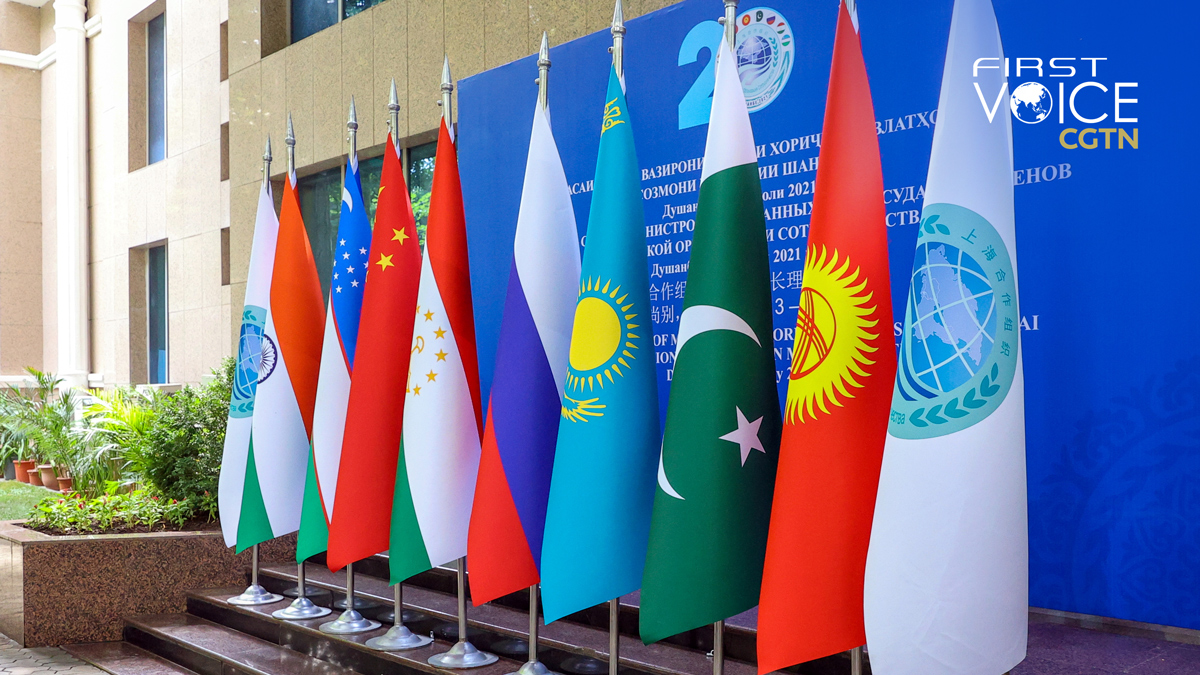
Editor's note: CGTN's First Voice provides instant commentary on breaking stories. The daily column clarifies emerging issues and better defines the news agenda, offering a Chinese perspective on the latest global events.
The chaotic situation created by the irresponsible U.S. withdrawal from Afghanistan has rattled its neighbors.
At this uncertain moment the vision of shared regional development, respect for sovereignty and mutual cooperation to fight radicalism and terrorism represented by the Shanghai Cooperation Organization (SCO) is more important than ever.
The U.S. actions in Afghanistan are a perfect example of why trying to impose hegemony with force will always fail.
By butting into the internal affairs of Afghanistan, the U.S. actually froze the development of the country for decades.
U.S. officials may have believed they were "nation building," but in fact their attempt to impose a friendly client state at the point of a gun simply ended up created an extended civil war and propping up a bloated and corrupt government that collapsed the moment the U.S. retreated.
Afghanistan understandably is a central concern at this year's SCO meeting. The initial impetus of the organization was, after all, to combat extremism and terrorism in the region and protect the security of all the member states.
Obviously, the fast-evolving situation in Afghanistan is of concern to all members of the organization.
In the spirit of respecting each other's sovereignty, SCO members are taking a circumspect attitude. Adhering to the commitment of not to interfering in the internal affairs of others, many nations including China hope Afghanistan chooses its development path based on its actual conditions – and are ready to help if Kabul asks.
This doesn't just follow "the golden rule" of international politics. As we have seen from the U.S. example, meddling always backfires.

Afghanistan's Taliban delegation arrives for an agreement signing between Taliban and U.S. officials in Doha, Qatar, February 29, 2020. /AP
Afghanistan's Taliban delegation arrives for an agreement signing between Taliban and U.S. officials in Doha, Qatar, February 29, 2020. /AP
Addressing the SCO on Friday, Chinese President Xi Jinping said that external forces should never be allowed to interfere in the internal affairs of countries under any pretext. The future of a country's development and progress should lie firmly in the hands of its people, he emphasized.
This view was echoed by Pakistan's Prime Minister Imran Khan, who said Afghanistan could not be "controlled from the outside." He said that Islamabad will continue supporting its neighbor, even as he urged the Taliban to live up to the promises they have made.
For the past two decades, China has been literally building bridges and roads across Asia to make the region more prosperous and connected.
This is the path to a common future for mankind – not trying to force people to come around to your way of thinking at the point of a gun.
The importance of the SCO is an example of how this approach is bearing fruit.
For example, the SCO brought together the leaders of Pakistan and India for dialogue. The two nations have a history of difficult relations, and often have very different views on security issues.
Indian Prime Minister Narendra Modi noted "the biggest challenges in this area are related to peace, security and trust deficit," but said that "landlocked Central Asian countries can benefit immensely by connecting with India's vast market... All [SCO] member states must ensure that connectivity projects must not be affected by the situation on ground. Of course, all this must be done respecting each nation's sovereignty."
The very act of Modi and Khan talking together with other regional stakeholders is an example of how the SCO works to improve trust and cooperation on shared security threats. All the members, even those with difficult relationships, have a vision of a shared and prosperous future, with full respect for each other's sovereignty.
It is tempting to use power and bullying to achieve foreign policy goals. However, this approach at best will lead to hollow victories, and will certainly backfire, sooner or later.
Countries should be firmly supported to explore their own development paths and models of governance suited to their domestic conditions.
(If you want to contribute and have specific expertise, please contact us at opinions@cgtn.com.)

